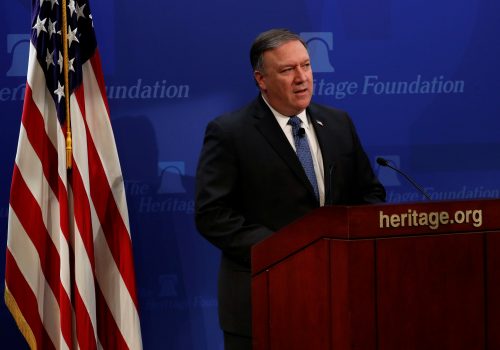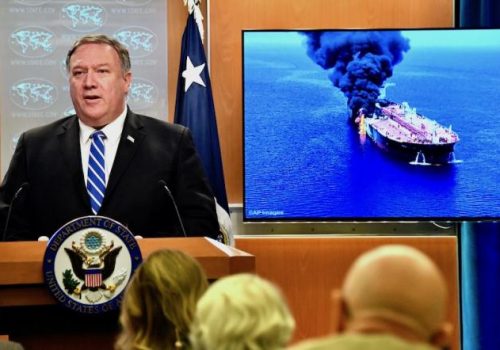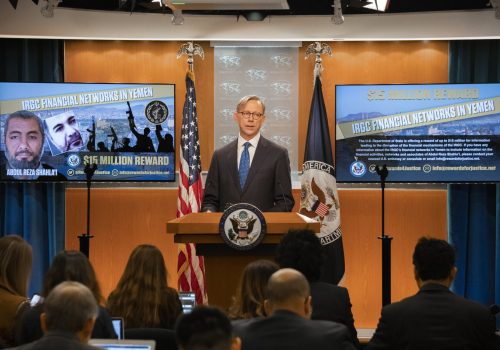The failed UN Security Council vote on Iran proves why diplomatic engagement matters
On August 14, the United Nations Security Council (UNSC) voted against the United States’ proposed extension of the arms embargo against Iran. The US was only accompanied by the Dominican Republic, while the E3 (France, Germany, and the United Kingdom) and eight others abstained. This is an unprecedented number of abstentions against a US proposition on a matter of this caliber. It shows unity among our allies that diplomatic engagements would have identified. Though the rejection does not come as a surprise, it is a dark reminder that the Trump administration’s “maximum pressure” policy has not prepared for the worst. Instead, Secretary of State Mike Pompeo and former Special Representative for Iran Brian Hook had been scrambling for months to try to get this vote passed only for it to be rejected.
When the US withdrew from the Joint Comprehensive Plan of Action (JCPOA) in May 2018, it also withdrew from enforcing legal authorities that are still tied to the deal, even though Trump administration officials—especially Pompeo—have attempted to justify the case. In many ways, it appears that the maximum pressure campaign did not anticipate for the potential expiration of the arms embargo. This is yet another unintended consequence of the failed strategy. The US Department of State has been leading the charge on Iran policy, but it has only constrained relations with its European allies and created heightened tensions in the Middle East for the last three and a half years.
The E3’s votes of abstention are the most significant. Since the US withdrawal, France, Germany and the United Kingdom have consistently maintained a cohesive message in support of the JCPOA. It is possible that they are maintaining their position in order to press the US to return to the nuclear agreement or will propose negotiations for a new deal. But another more likely possibility is that the E3 is using this vote as a delay tactic. They are looking to wait out the results of the November elections before making a decision. As such, the E3s vote of abstention is indicative of their strong desire to preserve the JCPOA. From a European perspective, it is not only the best possible outcome for security interests in the Middle East, but the deal is also economically beneficial for European markets.
This may also be a preview into what the US can expect should authorities follow through with the so-called “snapback” sanctions. The E3 have pushed back against the notion of using them and the US withdrawal from the nuclear deal in favor of the maximum pressure campaign is enough for the E3 and other UNSC members to further resist any US efforts. This is precisely why it is imperative for the US to have an Iran strategy that prioritizes diplomatic engagement. Such a strategy would have prevented outcomes such as the stinging defeat of the UN security vote and bolstered support for our efforts to bring Iran back to the negotiating table.
An additional challenge for the US is the debate over its legal claim to reimpose snapback sanctions. United Nations Security Council Resolution (UNSCR) 2231 established the snapback mechanism, but this can only be utilized by participants of the JCPOA, which the US withdrew from. This means that the legality of American use of snapback sanctions remains in question in the minds of most of the international community, though the US has tried to argue otherwise.
While the E3 and other European partners stand with the US on the necessity of extending the arms embargo, they believe that such a task will be an uphill battle because the US withdrew from the JCPOA. In a statement, Pompeo said that the Security Council “rejected a reasonable resolution to extend the thirteen-year old arms embargo on Iran and paved the way for the world’s leading state sponsor of terrorism to buy and sell conventional weapons without specific UN restrictions in place for the first time in over a decade. The Security Council’s failure to act decisively in defense of international peace and security is inexcusable.” However, the UNSC voted by the rules. There was no basis for the Security Council to vote in favor of the extension and, even if it did, China and Russia’s negative votes had vetoed the proposition.
The Trump administration has consistently warned the international community that Iran will be able to essentially buy a conventional arsenal if the arms embargo expires. This is indeed the case, but the US has not done much to prevent this from happening. The maximum pressure campaign has done little to curb Iran’s malign influence and stop the illegal transfer of weapons and has led to the unintended consequence of the arms embargo expiring. Iran has managed to get by thus far with a domestically made arsenal and, should the embargo expire, Russia and China will undoubtedly be at Tehran’s doorstep with a menu of arms for sale. More importantly, the US’s potential fight for snapback sanctions will test the limits of the maximum pressure strategy.
The six Arab nations in the Gulf Cooperation Council have been staunch supporters of the US’s fight to extend the arms embargo. Given the historic normalization of relations between Israel and the United Arab Emirates, the US should continue to advance diplomatic efforts that may help with resolving this major issue leading up to October 18. The future of Iran policy hinges on a reset, regardless of who wins the election in November. Should the arms embargo expire—and it likely will—the US faces a tough battle to reimpose snapback sanctions. Whether the US is ultimately successful or not, this trajectory will continue to strain diplomatic relations with its allies—particularly the E3. But, more importantly, the international community will face an even more hostile Iran that potentially has greater access to conventional weapons. Diplomatic engagements have proven their success in light of the peace deal. The lessons learned should be applied in this case as well. Thus, with this challenge ahead, it’s time for the Department of State to return to its roots.
Alma Keshavarz is a post-doctoral fellow at the Institute for Politics and Strategy at Carnegie Mellon University. She previously served in the Office of Policy Planning at the Department of State where she covered Iran and Iraq.
Subscribe for more from IranSource
Sign up for the IranSource newsletter, which provides a holistic look at Iran’s internal dynamics, global and regional policies, and posture through unique analysis of current events and long-term, strategic issues related to Iran.
Image: The Secretary of State of the United States Michael R. Pompeo (right), virtually participates in the UN Security Council in Washington DC, United States on June 30, 2020. Pompeo, demanded this Tuesday (30) the Council Security Council to extend the arms embargo against Iran, assuring that not doing so will give Tehran free rein to endanger peace and stability in the entire region. "The Council cannot simply expect Iran to act in good faith," Pompeo defended in a video conference intervention before the highest decision-making body of the United Nations.


